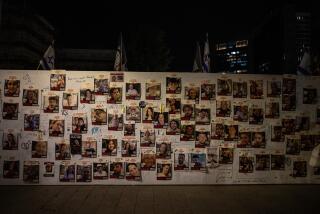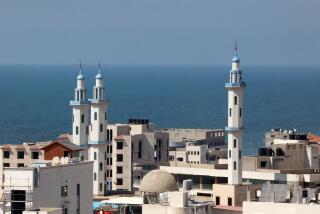Famed French judge Bruguiere tells of a troubled Pakistan
WASHINGTON — The Pakistani government has lost control of rogue military and intelligence officers who aid Al Qaeda and its allies and play a double game with the West, a renowned French judge asserts in an upcoming book.
For three decades, Jean-Louis Bruguiere was an investigative magistrate, a powerful role that combines the duties of prosecutor and judge and allowed him to cultivate high-level contacts from Algiers to Moscow. He stepped down from that post in 2007, and now serves as the European Union’s envoy to Washington on issues related to the financing of terrorism.
His 481-page book, “What I Could Not Say,” is to be published Monday in France.
An advance copy obtained by The Times bolsters the 66-year-old official’s swashbuckling reputation with previously undisclosed witness testimony and intelligence documents from a trove of case files.
Pakistan’s government has long faced criticism that elements of its security services have protected militant groups. The government says it is trying to purge them, and it has launched offensives this year against militants in the Swat Valley and South Waziristan, where its forces are currently battling entrenched Taliban fighters.
The book details French investigations of extremist activity in Pakistan, including a case in which officials went as far as hiding militants from CIA inspection teams at a training camp run by the Pakistani military. Military handlers then sent the trainees on terrorist missions to the West, Bruguiere asserts.
The United States made strategic errors in dealing with Pakistan, he says, adding that it might be too late to clear the security forces of those who sympathize with the extremists.
Islamic radicals seemed to benefit from “a certain sympathy, to say the least” within Pakistan’s Inter-Services Intelligence agency, he writes, citing one of his cases. “We did not have the impression that our interlocutors considered [Al Qaeda militants] to be terrorists.”
Published as interviews with Jean-Marie Pontaut, an editor at L’Express magazine, the book is a portrait of one of Europe’s best-known crime fighters. The stocky, square-jawed, restless Bruguiere comes from a line of judges dating back to Napoleonic times. He tells of interrogating fanatics and eating crocodile meat during a harrowing investigative trip to Zaire, now the Democratic Republic of Congo. But he also writes about growing up among Surrealist painters, who were friends of his father, an art aficionado. And he participated in Paris’ leftist student protests of May 1968.
Tracing a history of modern-day terrorism, the book describes the nine-year investigation of the 1989 bombing of a flight from Chad to Paris that killed 170 people. The global hunt culminated in the convictions, in absentia, of top Libyan officials. The judge also recounts the fight against far-left and Palestinian groups supported by the Soviet Union.
After terrorist attacks on France in the 1990s, Bruguiere became an expert on Al Qaeda and an early warning voice. Today, he says, errors by Washington contributed to the crisis in Pakistan.
“The situation in Pakistan is among the most worrisome,” he writes. “The central government has lost control of certain elements of the army and the ISI, an intelligence service that no longer has the trust of its foreign partners.”
The judge cites his investigation of Willie Brigitte, a Frenchman who was convicted of terrorism charges in 2007.
After the Sept. 11, 2001, attacks on the United States, Al Qaeda militants helped Brigitte go to Pakistan to train with hundreds of Arabs and Westerners and several thousand Pakistanis and Afghans at a mountain complex in Punjab. Affiliated with Al Qaeda, the camp was run jointly by the Lashkar-e-Taiba extremist group and Pakistani security forces, which supplied arms and instructors, the book says.
CIA officers accompanied by Pakistani officials made four inspections of the camp, part of an agreement in which Pakistan had promised to prevent foreign militants from training with Lashkar, Bruguiere writes.
“But, since most of the officers of Lashkar belonged to the army, these inspections were doomed to draw a blank,” the book says. “The foreign recruits were alerted on the eve of the arrival of the inspection teams by their instructors, military men informed by their hierarchy.
“The trainees then had to . . . erase any traces of their presence and head to an elevation of more than 13,000 feet while the inspection lasted.”
The book says Brigitte testified that his handler was a Pakistani military officer, identified as Sajid, who sent the Frenchman to Australia to join a cell plotting bomb attacks on targets that included a nuclear plant. Alerted by French investigators on Brigitte’s trail, Australian police arrested the group in 2003.
Sajid also dispatched militants for missions in Britain and in Virginia, where authorities later convicted Americans who were part of a group known as the “paintball jihadis” and who were fellow trainees of Brigitte, the book says. A French court convicted Brigitte on terrorism charges and sentenced him to nine years in prison.
In 2006, Bruguiere went to the Pakistani port city of Karachi to investigate a suicide bombing that had killed 11 French naval contractors three years earlier. Pakistani security officials were uncooperative and hostile, he asserts.
“French officials in Pakistan were the target of threats and physical intimidation: a way of dissuading us from returning,” he writes.
The George W. Bush administration underestimated the threat in Pakistan largely because it was distracted by the war in Iraq, Bruguiere says. He says U.S.-French tensions over Iraq did not harm anti-terrorism cooperation, and he writes about his many friends and allies in U.S. law enforcement.
But Bruguiere says he warned U.S. officials that the war would worsen Islamic extremism. He dismisses former Vice President Dick Cheney and former Deputy Defense Secretary Paul D. Wolfowitz as “men who did not understand the Arab world” and “felt invested with a quasi-divine sense of mission.”
At the same time, Bruguiere shares with U.S. conservatives a deep suspicion of Iran. Attacks by Iranian operatives in France and elsewhere show that Tehran’s security apparatus is the “real heart of power,” the book says.
Iran has used systematic deception to manipulate Western diplomats in talks about its nuclear program, while preparing a global terrorist infrastructure that could be used in a confrontation with the West, Bruguiere charges.
Iran also could strike in unexpected ways in remote places such as West Africa or Latin America, where Tehran’s longtime ally Hezbollah has an entrenched presence, Bruguiere warns.
“These networks . . . are able to create circumstantial alliances with drug cartels operating in Colombia and Mexico,” the book says, referring to the convergence of extremists and traffickers as “a complex configuration of threats directed at the United States.”
--
More to Read
Sign up for Essential California
The most important California stories and recommendations in your inbox every morning.
You may occasionally receive promotional content from the Los Angeles Times.










